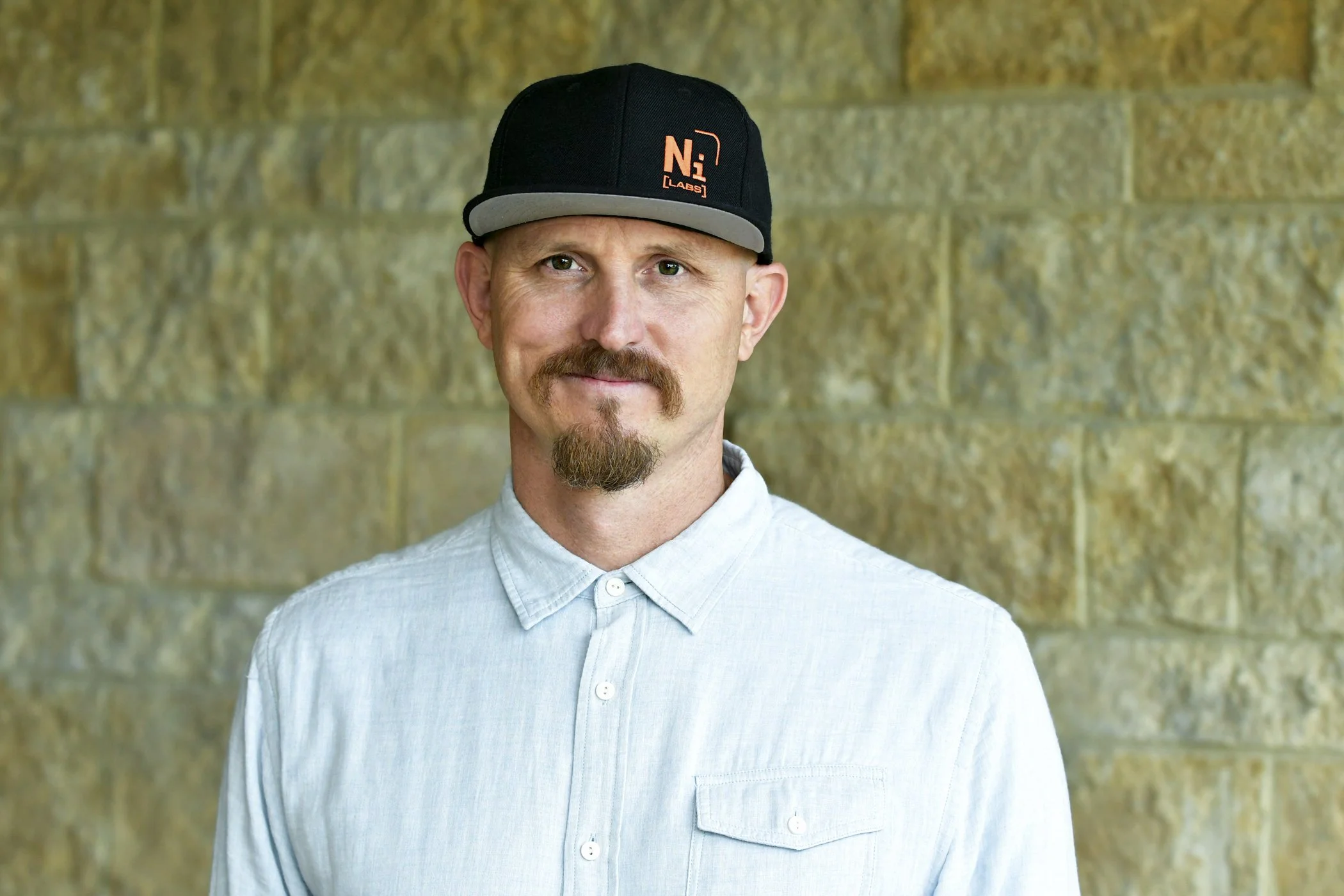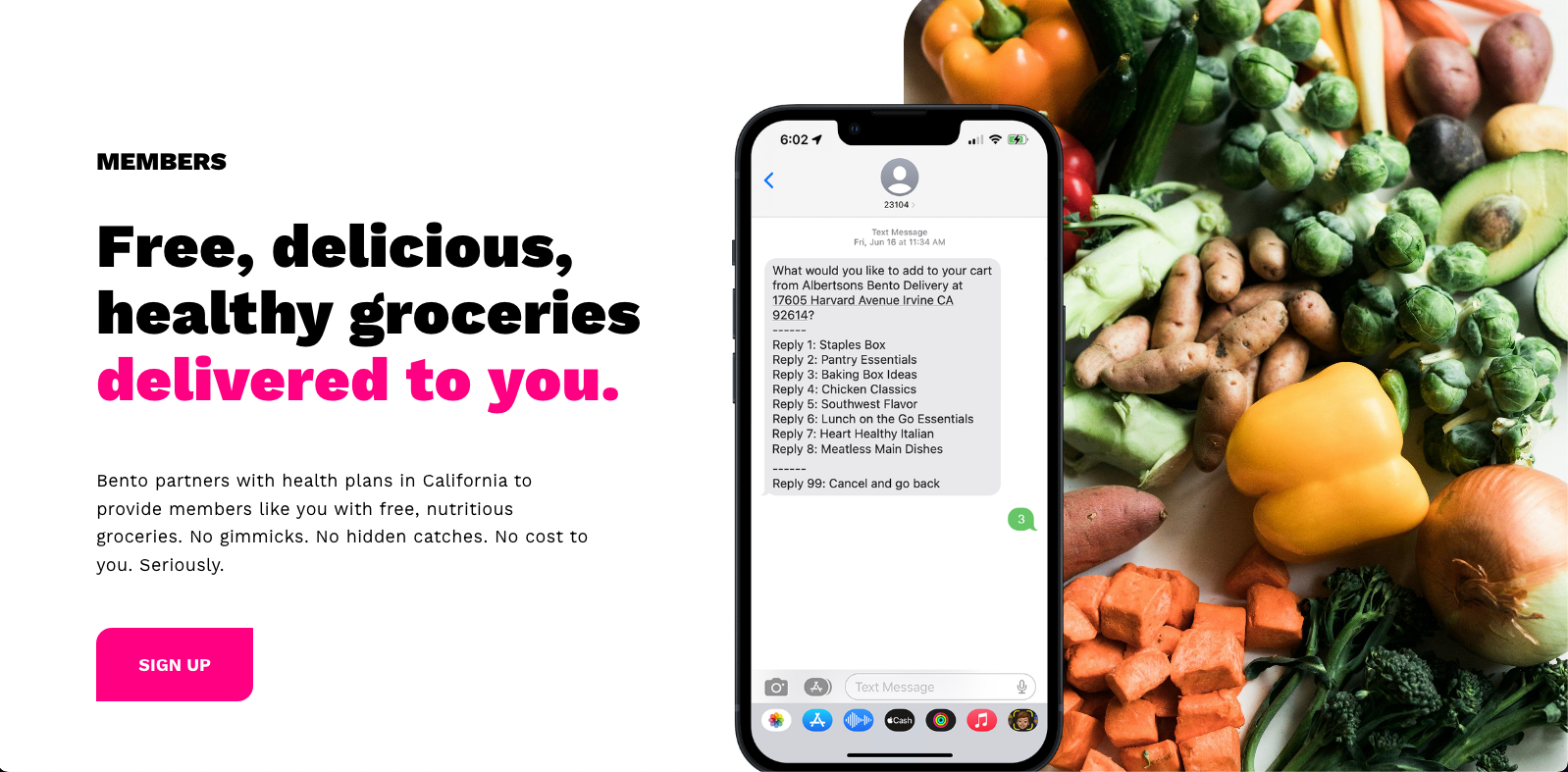How Mick Ebeling’s Bento Is Fighting Hunger and Steering People Toward Healthier Lives
As nearly 50 million Americans face food insecurity, the gap between surviving and thriving often comes down to access to something as simple as a nutritious meal. Hunger doesn't discriminate; it affects individuals and families across all walks of life.
Bento, a technology-enabled service, is revolutionizing the way we combat this crisis. By connecting low income community members with medically tailored groceries – all via a simple SMS text message and at no cost to the member – Bento is not only eliminating food insecurity but addressing the larger issues of preventable chronic health conditions that our most vulnerable populations are most at risk of. And Bento does it in a way that prioritizes the dignity of each community member.
In practice, Bento operates with the simplicity and dignity that people deserve. Using disease-specific nutritional guidelines, their team of registered dietitians provide healthy grocery options personalized to members’ particular health, nutritional needs, and cultural preferences, delivered from nearby grocery stores. On the backend, orders placed through Bento appear just like any other online customer order sent to retail grocery chains with nothing differentiating the order was placed by someone struggling with food insecurity.
As a certified “food-as-medicine” Medicaid benefit provider in the state of California, Bento now has the ability to reach millions of food insecure people across the state. They are empowering people to nourish themselves, allowing them to focus on their families, work, or health without the constant worry of where their next meal will come from. Through its integration of registered dietitians and case management, Bento helps individuals not only eat better but also take steps toward improved health outcomes. The entire process is designed to be an easy, accessible, and stigma-free experience for our community members – ultimately driving a healthier future for those who need it most.
At HealthX Ventures, we firmly believe that Bento’s business model, which taps into people's core humanity, offers a compelling solution that both enterprises and healthcare organizations are willing to support. We see Bento as a win-win solution: by providing nutritious meals in a dignified way, Bento engages populations who often skip regular checkups, which can lead to costly ER visits. This proactive approach not only fills a critical need but also helps payers encourage healthier lifestyles, reducing expensive emergency care and improving overall outcomes for patients.
Mick Ebeling, CEO and Co-Founder of Bento, is a visionary leader who has dedicated his career to solving some of the world’s most pressing social challenges through innovative technology. Named one of Fortune’s World’s 50 Greatest Leaders and a three-time recipient of TIME Magazine’s Best Inventions of the Year, Ebeling is known for his pragmatic yet deeply humanitarian approach. As the founder of Not Impossible Labs, Mick has earned a global reputation for leveraging technology to create life-changing solutions. With Bento, he brings this same passion, aiming to tackle food insecurity in the U.S. by empowering individuals with a simple, dignified, and scalable solution.
We asked Mick to share the story about his journey building Bento, as well as his insights into how we can solve food insecurity:
Was there a defining moment that motivated you to tackle food insecurity on such a large scale?
ME: Living in Venice Beach, I am constantly surrounded by people who are less fortunate. There is an incredible organization called Safe Place for Youth that does specific outreach to homeless kids, ranging anywhere from 14 all the way up to early 20s.
We were exposed to their plight and their struggles living on the street. The genuine nature of their character—hearing their aspirations, goals, and struggles—led to this massive “AHA!” moment: what separated these kids from the kids who didn’t have to worry about eating was absolutely paper thin.
If you didn’t know those kids were homeless, if you didn’t know why those kids were hungry, you would think that they were just like anybody else.
That, to me, was absurd. The idea that children across the country—who want to get ahead, who want to go to school, who want to make something of their lives—were limited from being able to reach those aspirations and goals because of a lack of food, it just didn’t feel right.
Once we recognized that, we asked, “What if we were to remove that? What would that open up for these kids?” One thing to know about Not Impossible Labs, we don’t just talk about what we can do. We commit, and then we figure it out.
We set up a way where we could start feeding these local homeless kids. Then when we talked to them, we realized that this super easy and simple thing—having access to food and being able to eat—was transforming their entire outlook on life. And THAT was when we realized we need to scale this and think much bigger.
How did you transition from storytelling and production to founding a company focused on eliminating hunger?
ME: Before starting Not Impossible Labs, I was a producer. I made stories. I made music videos. I made films. It taught me that any story has the ability to motivate and inspire—when it’s well told. That’s a skill set that stays with you.
After we discovered just how devastating this thing called “food insecurity” was for the kids of Los Angeles, it made us want to get out there and tell the story of these kids. We wanted to give people the chance to relate to them and see that they were people, just like any of us. But for them, unlike most of us, food was such a massive and integral part of their daily struggle.
The more we told these stories, the more passionate we got about what we were actually doing and the importance of it. All it takes is an unfortunate series of events that could land any of us in a situation where we face food insecurity. And wanting to do something about that is how Bento came to be—a company whose mission is to eliminate food insecurity in the U.S.
What were some of the biggest challenges you faced in scaling Hunger: Not Impossible into Bento, and how did your “commit, then figure it out” mantra guide you through those obstacles?
ME: Throughout the journey of inventing and incubating Hunger: Not Impossible—which is now Bento—we encountered SO many problems. One of the biggest and most challenging hurdles was figuring out how to tap into a scalable food supply chain.
We realized that if we had to create a supply chain from scratch, it would take a lot of time for us to reach any kind of significant scale. That’s when we decided to pursue integrating Bento into the already existing, present-day food supply chains (i.e. restaurants and grocery stores). We wanted to do it in a way that was frictionless—via text that was enabled by API access to existing online ordering platforms and point-of-sale systems for those restaurants and grocery stores.
But having a vision for what you have to do is one thing… Being able to execute it is quite another. One of the main reasons we were successful is because of one person (read: hero) who championed our mission—Thomas Renese, Chief Marketing Officer at Uber Eats. Thomas is one of those key characters in the Hunger: Not Impossible / Bento story that came at the perfect time and helped us to propel forward. He saw our vision—and the reason behind it—and was able to break through any internal red tape at Uber Eats so we could get it done.
So we figured out how to access the online ordering APIs for restaurants, and then we knew that in order to scale, we had to do the same for grocery stores. Another Everest to climb, but once we achieved it, we had completed the supply chain circle for Bento.
Keep in mind that NONE of this would be possible without the hardworking and dedicated Bento team, who had (and continue to have) such a strong belief in the cause that they, too, committed and were figuring it out with us.
How do you measure the success of Bento, and what milestones are you most proud of achieving so far?
ME: Bento’s mission is to eliminate food insecurity, so what success looks like for us comes down to how many people we are actually serving. These are the people who we know are food insecure and have a chronic condition (i.e. diabetes, hypertension, etc). Then, we’re looking at how frequently they use the service. What we know is that if they have adopted and integrated Bento as part of their nutrition plan, we are steering them towards a better health outcome—and overall healthier life.
We’ve had a lot of milestones over the years, but two stand out. First is that we are incredibly proud of the organic growth that sprung from word-of-mouth and referrals. Those referrals continue to bring more people into the Bento ecosystem. The other is that currently 85% of the people who enroll, use the benefits every week. This just shows us that we’ve created something special.
I’ll also add that we’re most proud of the culture we’ve created within the Bento team and consider it one of our biggest achievements—we call it the “Bento Beat.” It’s unlike anything I’ve experienced, that Adam Dole (Bento’s COO) has experienced, that Deepak Kumar (Bento’s CTO) has experienced. And these are the people on the team who have worked for other companies and startups. The entire team is so mission-driven because we all understand that the person on the other end of the line—or in our case, text—is hungry and food insecure! We understand the ramifications of that, and we take it very seriously. I think that is single-handedly why Bento has been successful and will continue to be successful.
How has partnering with HealthX influenced Bento’s growth and impact, and what unique value has HealthX brought to your mission of eliminating hunger in the United States?
ME: Every investor says, “We want to be part of the family, we want to be part of the team, we want to help you whenever you need our help.” And while all investors may have those intentions, very few actually follow through on it.
For us, HealthX Ventures is a case study of investors executing on what they say. The HealthX team is actively rolling up their sleeves and scrubbing in to help solve some of the challenges that come up. We’ve felt that true sense of teamwork, especially from Mark Bakken, Kristi Ebong, Brian Lindstrom, and Darcey Nett. It’s not something you can quantify. You just have to actually experience it.
What future trends in technology or social innovation do you believe will be most influential in the fight against hunger and food insecurity?
ME: I think the trend that is going to single-handedly help exponentially change the plight of food insecurity in this country is when we see the true integration of quality social programs in healthy food, dignified food, and simply accessed food—which describes the Bento offering—with other things like WIC and SNAP, doctor's visits, and prescription medications.
When that happens, that’s when we can start to move towards the integration of the whole self, the whole patient, the whole person—and all of the components that are going to make them a healthier human being. That’s the trend I think has the ability to transform the health and well-being of our most vulnerable in this country.
—
Learn more about Bento at gobento.com.
HealthX Ventures is a digital healthcare-focused venture capital firm. We invest in innovative companies making healthcare safer, more efficient, and more affordable by delivering easy-to-use, cost-effective, and scalable solutions to the market.



